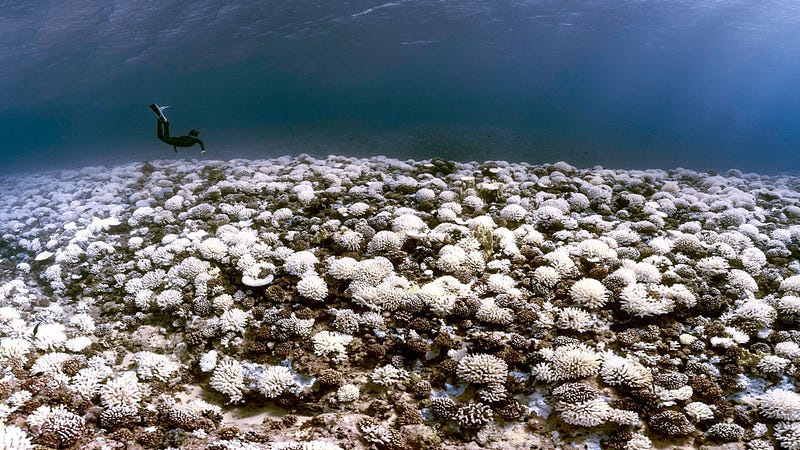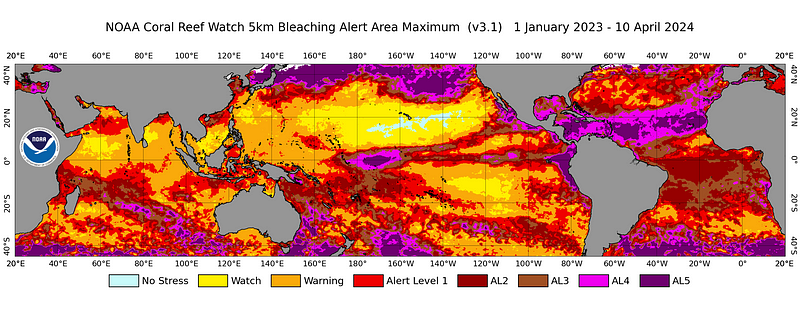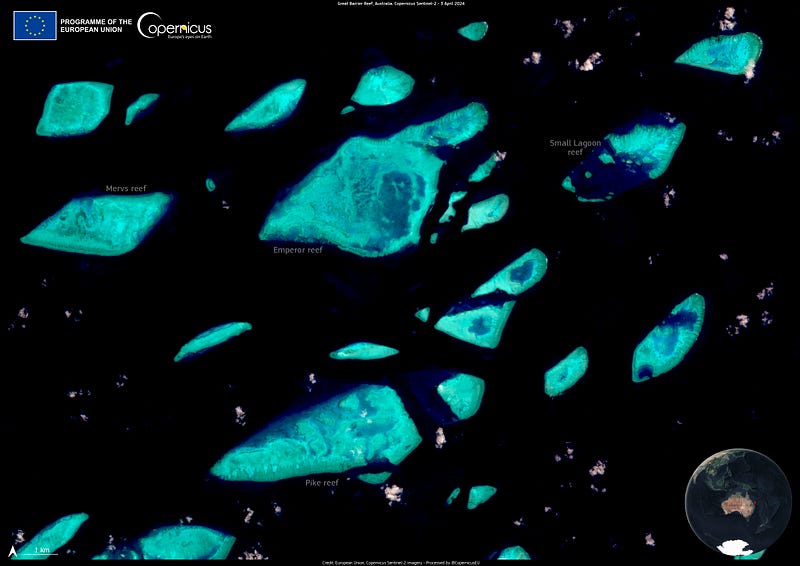Corals Emit a Critical SOS as They Face a Dismal Future
Written on

Coral reefs are currently experiencing the most extensive bleaching event in history, and immediate measures are necessary to prevent further damage. It’s a common misconception that coral is a plant and that its color is naturally white. In reality, coral is a marine invertebrate that forms colonies through polyps, engaging in a mutualistic relationship with zooxanthellae algae. The algae supply energy through photosynthesis and impart vibrant colors, while coral provides shelter and nutrients.
These marine organisms play a crucial role in the ecosystem, supporting about 25% of all marine species despite occupying less than 1% of the ocean’s surface. However, this relationship is delicate. Prolonged stress leads corals to expel their algae, resulting in a loss of their primary energy source, vibrant colors, and increased vulnerability to mortality.
The images of bleached coral may appear striking, showcasing their white skeletons through translucent flesh, but upon closer inspection, it becomes evident that they are suffering, devoid of life and vitality. Coral is particularly sensitive to rising global temperatures, managing to survive bleaching only if the heat is not excessive or prolonged. Severe marine heatwaves, however, can lead to immediate death.
For over a year, global average sea-surface temperatures have reached unprecedented seasonal highs, based on records dating back to 1979. These historical benchmarks have not merely been surpassed; they have been shattered.
This alarming trend has culminated in the fourth and most severe global coral bleaching event to date.
A Dire Call for Help
> “From February 2023 to April 2024, significant coral bleaching has been documented in both the Northern and Southern Hemispheres of each major ocean basin,” said Derek Manzello, Ph.D., NOAA Coral Reef Watch coordinator.
A global bleaching event is recognized when a minimum of 12% of corals in each primary ocean basin undergo extreme heat stress within a year. Currently, a staggering 54% of ocean waters that host coral reefs are experiencing mass bleaching across the tropics, the Caribbean, Brazil, the eastern Tropical Pacific, significant areas of the South Pacific, the Red Sea, the Persian Gulf, and the Gulf of Aden. The Great Barrier Reef in Australia, a renowned global landmark, is enduring its worst bleaching episode in eight years, with 80% of the reef impacted, far surpassing the previous record of 60% in 2017.

The first global bleaching event in 1998 exposed 20% of oceanic reef corals to heat stress severe enough to cause bleaching. This number escalated to 35% in 2010, and a concerning 56% from 2014 to 2017.
Manzello cautions that the current bleaching episode is likely to surpass the catastrophic bleaching events recorded between 2014 and 2017. Why? “Because the percentage of reef areas experiencing bleaching-level heat stress has been increasing by roughly 1% per week.”
The Underlying Causes
Over 90% of the excess heat from human-induced climate change is absorbed by the oceans, creating a false sense of manageability regarding climate change. Our oceans are now on the front lines of extreme temperatures, setting new records daily. Beyond warming, the oceans are also facing acidification and oxygen depletion, which severely disrupts marine ecosystems. From 1971 to 2018, the ocean absorbed an astounding 396 zettajoules of heat — equivalent to over 25 billion Hiroshima atomic bombs — with this rate of heat gain accelerating.
Typically, the global average sea-surface temperature peaks in March, marking the end of summer in the Southern Hemisphere. However, last year saw record temperatures in August, which were exceeded again this year. While scientists have hypotheses, there are no definitive answers regarding the phenomenon.
A likely factor is El Niño, a natural climate cycle originating in the equatorial Pacific that tends to elevate global temperatures and has significantly contributed to the recent record ocean heat.
The ongoing global event began last summer in the Northern Hemisphere. Alarm bells first rang at Florida’s southern tip, where an exceptionally intense and prolonged heatwave resulted in sea temperatures comparable to hot tubs. This rapid increase in heat triggered severe heat shock in soft corals, effectively disintegrating them and transforming entire colonies into graveyards.
This lethal combination then moved to the Southern Hemisphere, leading to 98.5% of Atlantic reef regions facing bleaching-level heat stress. Subsequently, the crisis spread globally.

Looking Ahead: La Niña and Coral Survival
NOAA predicts that La Niña, the cooler counterpart to El Niño, will arrive between June and August this year, offering a glimmer of hope.
However, bleaching events have also occurred during La Niña years.
> “I am becoming increasingly concerned about the 2024 summer for the wider Caribbean and Florida. As summer approaches and the bleaching season for Florida and the Caribbean begins, it won’t require much additional seasonal warming to push temperatures past the bleaching threshold. The bottom line is that as coral reefs experience more frequent and severe bleaching events, the time they have to recover is becoming shorter and shorter. Current climate models suggest that every reef on planet Earth will experience severe, annual bleaching sometime between 2040 and 2050,” Manzello stated.
The Intergovernmental Panel on Climate Change warns that if global warming exceeds the 1.5°C limit established by the Paris climate agreement, 70–90% of existing reefs will suffer severe degradation or perish. Should global temperatures reach the anticipated 2°C rise by 2050, nearly 99% of Earth’s corals could die. Over the past year, global temperatures have reached the highest recorded levels, sitting 1.58°C above pre-industrial averages (though this benchmark will not be officially breached until this trend continues for a decade).

Coral has the potential to recover from heat stress, but it needs time — ideally several years. Yet weakened coral is more susceptible to diseases and can easily perish. Research led by Jennifer McWhorter from NOAA presents a potential silver lining. It indicates that corals residing in cooler, deeper waters (30–50m depth) in the Great Barrier Reef may withstand global warming up to 3°C better than their shallow-water counterparts.
The stark truth is that we must recognize that reefs, as we know them, will undergo irreversible changes. Small-scale restoration efforts will not suffice to save corals on a global scale. Corals are shifting from being vibrant habitats for marine life to mere skeletal structures.
> But who wants to inhabit scaffolding?
The Path Forward: Protecting Coral Reefs
The economic value of the world’s thriving coral reefs is estimated at an annual $11 trillion.
They provide vital ecosystems for scuba diving, sustain coastal fisheries, and shield shorelines from the destructive impacts of tropical storms and hurricanes.
> “During significant storms, waves may reach 10 meters offshore, but the corals reduce their height to just 3 meters by the time they reach the shore. That protective barrier is now compromised,” said Brigitta van Tussenbroek, an expert in coastal ecology based in Puerto Morelos, Mexico.
Coral reefs face various threats, including diseases, polluted runoff, and sargassum seaweed, in addition to rising water temperatures. Yet, despite these challenges, fossil fuel consumption continues to rise, accompanied by increased greenhouse gas emissions.
I have been closely monitoring the ongoing mass coral bleaching crisis with deep concern. Throughout this period, one thought has consistently lingered in my mind: in 2020, fossil fuels received subsidies amounting to $5.9 trillion, equating to 6.8% of GDP, with projections indicating a rise to 7.4% of GDP by 2025. That translates to $11 million every minute. For every dollar allocated to combat climate change, at least five times that amount is funneled into subsidizing the very activities that threaten our survival.
While mainstream discussions often highlight potential remedies such as “super corals” or “cryogenically frozen reefs” that may withstand elevated ocean temperatures, these are merely temporary solutions. They are crucial for buying time for coral ecosystems, but the most effective way to safeguard reefs likely does not lie in a laboratory.
> Julia Baum, a marine ecologist and conservation biologist at the University of Victoria, succinctly stated: “The only real solution for coral reefs now is a rapid phase-out of fossil fuels.”
Transitioning to renewable energy sources offers our best opportunity to preserve coral reefs. As global citizens dedicated to a sustainable future, it’s essential that we acknowledge this reality. This issue transcends coral; it encompasses our future and the health of our planet. It’s time to be clear and resolute in our message.
Once coral dies, marine species that rely on coral sounds for navigation struggle to find their way home. Will we respond to the urgent SOS that corals are broadcasting globally and chart a sustainable course ahead?
Be heard.
Thank you for your thorough reading and support! **Subscribe* for immediate insights and join the 500+ Antarctic Sapiens community for weekly content.*